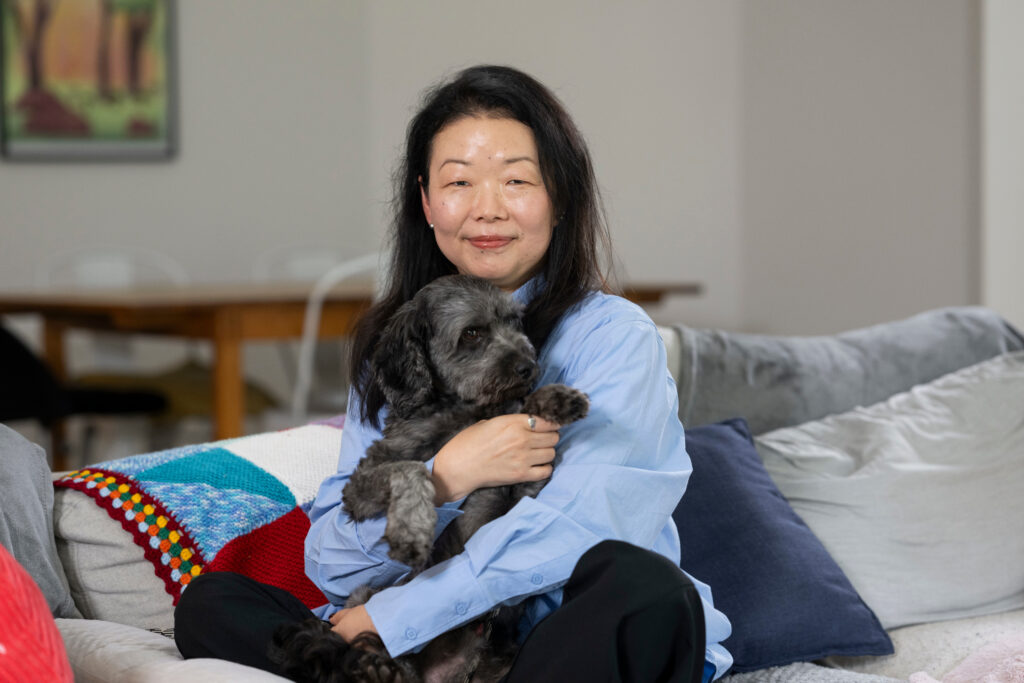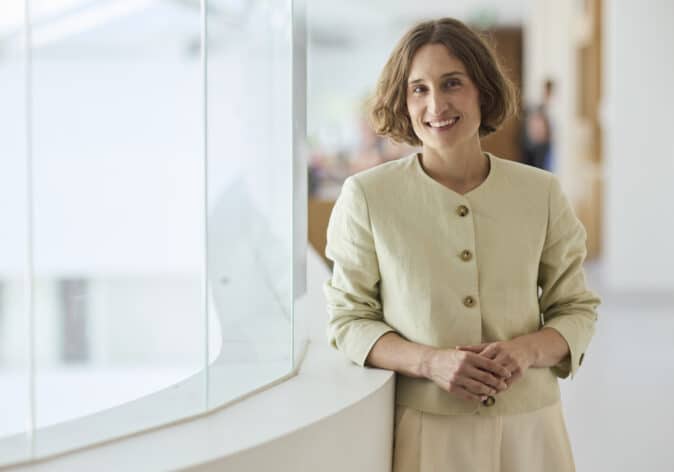Tamara Dawes is a mum and primary school teacher living in New South Wales who enjoys living in the country, going to the beach and spending time with her family and their dog. Around Easter time in 2021, Tamara had been dealing with some eczema and because of this had been performing frequent self-examinations when she noticed a lump in her breast.
She booked in with her GP who sent her for a mammogram, biopsy and ultrasound and two days later was diagnosed with breast cancer. We spoke with Tamara about her shock diagnosis, navigating breast cancer with a young family and the importance of supporting breast cancer clinical trials research.
“Looking back, I could probably only say that life before breast cancer was good. I had a nice place to work at a school that I used to teach at, lovely family, my friends, I liked living in the country. So, looking back now, I’d say it was good and there’s not many things that I could say were too bad.”
“Around Easter time in 2021, I did have a little bit of eczema and because of that, I had been keeping up with my self-checks and so I found the lump myself and being Easter I had to wait until the holiday was over to get in to see my GP. But once I went to see her, she did a really good job of sending me off the next day to get the mammogram, biopsy, ultrasound, and that moved fast, and I was diagnosed within two days of seeing the GP.”
“And that’s when things started to slow down a little bit. I had to wait for surgery, I met lots of doctors. The time after my diagnosis I had surgery first and then I had chemotherapy and then I had radiation. So, yeah, I had all of those in a straightforward way. Now I’m taking hormone medication for a few years.”
“I thought it was five years and then I found out this year that I hadn’t listened properly and it’s 10 years. So, I’ll just keep taking that as long as they say to. And that’s the maintenance that I’m doing now.”
Listen to the Podcast
We spoke with mum and primary school teacher, Tamara Dawes, about her diagnosis, navigating breast cancer, and the importance of supporting clinical trials research.
Did you know much about breast cancer when you were diagnosed?
“I didn’t know a lot. I guess everyone is aware and you hear people have it. You don’t realise how much information there is to take in and I’m the kind of person who does like to research things a lot. I’ve really tried not to just Google things. I used a tool called ‘My Journey’, but I try to just get the reputable information and learn everything I could.”
“Every time I had new appointments and spoke to the breast care nurse a few times, she was really helpful at filling in the blanks because often you feel like when you’re seeing a specialist they don’t have time for every single little thing and to fill you in on all the context, so it was great having someone who could give me all the information.”
“And then throughout my treatment I did try to learn as much as I could about what the treatments were and what kind of cancer I had. And I would read my pathology reports and things like that. And I know that’s not for everyone and there’s been times where I didn’t want lots of information, but I’d say overall I’ve tried to educate myself because I realised what I thought I knew about it was superficial and there’s just so much more to learn.”
How did you navigate telling your family?
“I remember telling my family. I can’t remember when I told my husband. I think it was just on the phone as soon as I left the doctors. I sat down and told the girls and tried to reassure them, even though I didn’t know what was going to happen. I just wanted to let them know that I felt like I was in good hands. And then telling my mum was sort of a bigger deal because I thought she would be more likely to think about the negative outcome.”
“So, my sister went with me to talk to mum together and that was fine. So, I guess everybody was supportive and I didn’t have to worry about people getting upset or giving me advice or letting out emotions like that. Generally, people were supportive, so it was fine.”
“I would say probably the most intimidating part of the treatment was beginning. The whole process and the first thing I had to start off with was the surgery, which was quite a big surgery because it was a bilateral mastectomy with the immediate reconstruction.”
When you started your treatment, what was that like?
“So, they were doing a lot of things, and it took a long time, and I had a very adverse reaction to all of the anesthetic and painkillers and all of that. So that was a bit dramatic at the start because it really hit me like a ton of bricks. And then with subsequent treatments, I think the first round of chemotherapy was the most difficult because they just give you a standard dose and see how it affects you.”
“And it was hard. But then the second time around they adjusted it and its sort of better, but I would say chemotherapy is probably the worst thing I’ve ever had to do in my life. And yeah, I’m glad I made it to the end. And I completely sympathize with people who choose not to because it’s so hard, it really is that hard.”
Why did you decide to participate in a clinical trial?
“I went to see my oncologist for my yearly checkup, and he said I would qualify or be suitable for this trial that he was aware of, and I felt like I could trust him. He’s been a really good doctor so I said I’m happy to find out about it and participate in it and hopefully all the data they get from me can help strengthen their trial and the medication that they’re trying to get approved or find out more about.”
“So, it was straightforward. I said, okay, and now I’m just doing it. There’s been so many advancements already, and you can tell from the stories of people who had different medications, or older versions of that, that it’s already improved. But I do think that, myself and a lot of other women are still really struggling with the side effects of treatment.”
“And though the medications may be better, they’re still a long way from being perfect. So, I think more research is just going to improve everyone’s quality of life. I’ve had a lot of side effects from all my treatment and the medication as well.”
And so, I assume that’s one of the goals they’re looking to achieve through trials is finding medication that’s less harsh. And I think there’s plenty of room for improvement, though lots has already been done for it.”
“Even though I’m taking the medication I was on before, I’m not taking the new medication, I still think all of that data is necessary and important. So, it doesn’t matter what part of the trial you’re in, it can really help someone.”
What would you say to someone who was thinking of participating in a clinical trial?
“For me, it’s been quite a positive process. As I said before, I like to have lots of information and find out about a lot of things. And it’s been great to have more consistent access to my doctor and the nurses in the trial. It’s really sort of confronting when they say we’ll see you in 12 months and it feels like it’s too long until you can see them again.”
“So being in a trial makes me feel like I’m being monitored a little bit more closely and if I have a question or a worry then it can be answered a lot quicker than that 12-month period. So, I think that’s just one sort of advantage that I’ve seen, but overall, I think it’s important.”
What are your hopes for the future?
“In terms of the research and treatment, I believe, and I hope that things will continue to improve and patients in the future will have a lot of those side effects and issues mitigated in ways that, you know, we haven’t seen yet.”
“For myself, I look forward to every year, just getting one year further down the track. And I love to celebrate with my family and my friends and just, I guess, take things one step at a time. It’s funny because you want to have a long future, but at the same time you just look at it in smaller increments.”
“Because if you’re only going to be here for a shorter time, and that could be from anything happening, you might as well make the most of it, enjoy it, travel and eat all the food and enjoy being around your family and friends.”



